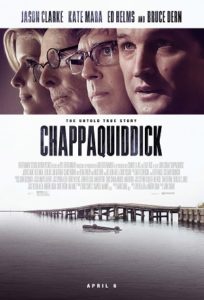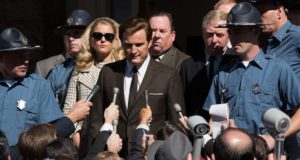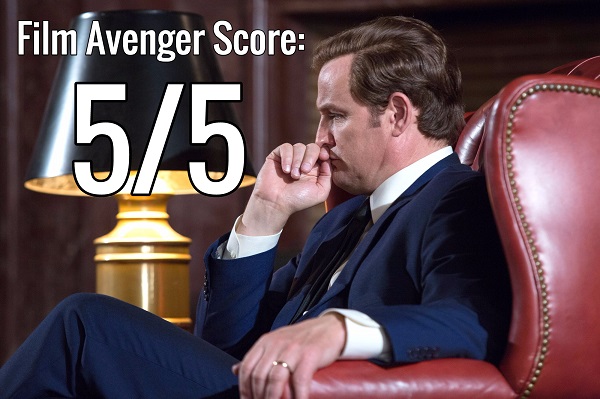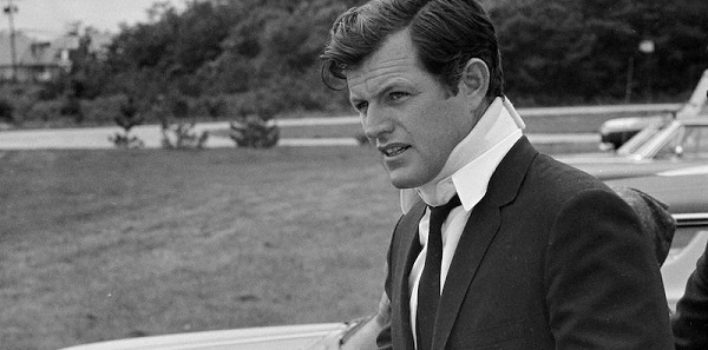Review| Chappaquiddick
 The night of July 18, 1969, is an important date in American politics, yet few Americans today know of its significance. That was the night that Senator Edward “Ted” Kennedy was involved in an automobile accident on Chappaquiddick Island that took the life of a young female staffer, Mary Jo Kopechne. It was an incident that haunted Kennedy and hindered his political career for the rest of his life.
The night of July 18, 1969, is an important date in American politics, yet few Americans today know of its significance. That was the night that Senator Edward “Ted” Kennedy was involved in an automobile accident on Chappaquiddick Island that took the life of a young female staffer, Mary Jo Kopechne. It was an incident that haunted Kennedy and hindered his political career for the rest of his life.
That tragic incident is the subject of the excellent new historical drama, Chappaquiddick – a relatively small movie that probably couldn’t have been made when the senator was still alive. There’s a lot of mystique and innuendo surrounding the incident, but the film sticks to the facts at hand and presents an unflinchingly fair look at the events of that night and its immediate aftermath. It’s the cold drama of history at its finest.
The story of Chappaquiddick comes to life through some amazing performances and brilliant storytelling. However, the themes of the story were what really got to me. Ted Kennedy’s reactions to the swirl of controversy around him turned the film into an intriguing character study, but not in the way one would initially think.
A Fair and Surprising Movie
Chappaquiddick was probably the fairest, most intellectually honest, and most ideologically even historical drama I’ve seen in years. In the current liberal culture of rampant bias and revisionist history, it was a welcomed breath of fresh air.
 Director John Curran and writers Taylor Allen and Andrew Logan should be commended for their artistic honesty and creative storytelling. They let the facts play out with no hints of the unsubstantiated hearsay or innuendo that has followed the Chappaquiddick incident for decades. The cold, hard facts are damning enough without any salacious conjecture. While there were some slight dramatic flourishes, they never interfered with the facts or skewed the perception of events.
Director John Curran and writers Taylor Allen and Andrew Logan should be commended for their artistic honesty and creative storytelling. They let the facts play out with no hints of the unsubstantiated hearsay or innuendo that has followed the Chappaquiddick incident for decades. The cold, hard facts are damning enough without any salacious conjecture. While there were some slight dramatic flourishes, they never interfered with the facts or skewed the perception of events.
No matter how one feels about Ted Kennedy (the man and/or his politics), one will get something from this film. Jason Clarke played Kennedy with a masterful amount of pathos. Personally, I have no admiration for Ted Kennedy, but Clarke gave him a desperate side that was almost sympathetic…until he shows his true side and becomes the calculating politician. He’s both charming and a scoundrel, and it was interesting to watch him deal with an inner clash of ethics.
Exceptional performances abounded in this film, particularly Kate Mara as Mary Jo Kopechne and Bruce Dern as Joe Kennedy, Sr. Mara’s performance was subtle and graceful, making Mary Jo into a well-rounded person instead of just a name in the newspapers. Dern was amazing, making the invalid Kennedy patriarch carry every scene he was in without uttering more than a few words (Joe Sr. had a debilitating stroke just a few years before). Dern masterfully communicated all the character’s emotions through his cold, pensive stare and it was wonderful to watch.
There was also some surprisingly good acting coming from Ed Helms and Jim Gaffigan – two men I usually see as comedians. They really impressed me with their dramatic range. Helms played Kennedy cousin Joe Gargan as pseudo-conscience for Ted and was really the only person that surrounded the senator that had any moral sense. Gaffigan gave Paul Markham a sympathetic, panic-stricken fear every time he was on screen after the accident.
“We All Have Our Flaws”
 Chappaquiddick was a fascinating story, but it’s also an interesting character study. In this instance, the word “character” is used to describe a person’s integrity. It is in the midst of a crisis that Ted Kennedy revealed what kind of a person he was, and it wasn’t good.
Chappaquiddick was a fascinating story, but it’s also an interesting character study. In this instance, the word “character” is used to describe a person’s integrity. It is in the midst of a crisis that Ted Kennedy revealed what kind of a person he was, and it wasn’t good.
The accident itself was terrible. A young woman died due to Kennedy’s gross negligence (he was more than likely drunk when he drove the car). What made the situation even worse was Kennedy’s selfish, arrogant and cowardly behavior in the aftermath.
“Whoever conceals his transgressions will not prosper, but he who confesses and forsakes them will obtain mercy.” Proverbs 28:13
Ted Kennedy’s primary concern throughout the whole scandal was his own reputation and political future. He did feel remorse for what he had done, but he worked even harder to avoid and obfuscate it. Kennedy desperately worked to engender sympathy by wearing a neck brace to Kopechne’s funeral. He blamed his father’s supposed stranglehold on his life (even when Joe Sr. brought in some well-connected friends to ensure Ted never went to jail). He resented living in his brothers’ large shadows. Kennedy seemed to have an endless bevy of excuses and no sense of personal responsibility.
At the end of the film, as Kennedy readied for his live televised address about the incident, he had one last chance to come clean, do the right thing and resign, as advocated by Joe Gargan. Instead, Kennedy chose to recite a carefully-prepared speech which glossed over his responsibility, made excuses for his behavior, and left his political future up to the voters (who went on to reelect him). He accepted his personal flaws and trudged ahead with no sign of repentance.
“If we confess our sins, he is faithful and just to forgive us our sins and to cleanse us from all unrighteousness.” 1 John 1:9
 We should not embrace our flaws and just say they’re just part of who we are, like Ted Kennedy. We have to be humble enough to realize when we have done something wrong, repent, and own up to our responsibilities. Every person will be held to account for the sins they have committed if they have not turned to Jesus for forgiveness. To repent is to turn away from sin, not accept it. Jesus died so that we could have the ability to turn from our sin and lead a more righteous life, not wallow in selfishness, arrogance, and self-pity.
We should not embrace our flaws and just say they’re just part of who we are, like Ted Kennedy. We have to be humble enough to realize when we have done something wrong, repent, and own up to our responsibilities. Every person will be held to account for the sins they have committed if they have not turned to Jesus for forgiveness. To repent is to turn away from sin, not accept it. Jesus died so that we could have the ability to turn from our sin and lead a more righteous life, not wallow in selfishness, arrogance, and self-pity.
The Final Word
Chappaquiddick was one of the best historical dramas in recent years. Its greatest strength is in its fairness. There was no spin, just the facts of the event, and I really appreciated that. The stellar performances made the story come to life and caused me to really look at the incident from both sides (though one side was inexorably wrong).
Ted Kennedy’s mad scramble to avoid judgment in the wake of the Chappaquiddick scandal reflects a truth about human nature. We all wish to bargain away and hide from the sins that we have committed. Kennedy selfishly sacrificed his personal integrity to maintain his political career, which is truly egregious.
Though I couldn’t be further from Senator Kennedy politically, I do sincerely hope that he found peace and repentance of Christ before the end of his life. Christ forgives even the most egregious of stubborn sinners, for He is filled with more grace than any of us can imagine. And we should thank Him every day that even a man like Ted Kennedy has the possibility of being with Him forever. Because, frankly, none of us are any better off in the eyes of a perfect God.








